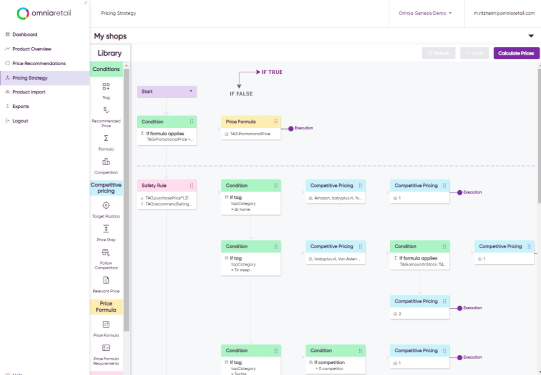What do brands need for a successful D2C strategy? Learn more in this interview with Jasper Wiercx, Solutions Consultant at Omnia Retail
What are the benefits of brands going direct to consumer, and how can they set themselves up for success in this new channel? Jasper Wiercx from Omnia Retail answers all your questions and more in this week's episode of Price Points.
AUTOMATICALLY GENERATED SCRIPT:
Hello and welcome to Price Points, the new podcast about all things pricing by Omnia Retail. My name is Grace, and I'm your host.
And this month, we're focusing on "brands and the direct-to-consumer, also known as the D2C, arena," and exploring why more brands are entering the direct to consumer market, as well as what they need to succeed in this sphere. To start learning more about this, I spoke with Jasper Wiercx, one of our solutions consultants here at Omnia and our in-house guy for brands and dynamic pricing.
Jasper is our newest addition the Omnia consulting team, but he has a long history of consulting. Before Omnia he worked as a strategy consultant at Deloitte for a few years, and before that he got his Masters in Business Economics from the University of Amsterdam. He's laid back and not one to waste words, opting instead to offer insightful and articulate words of wisdom every time he speaks.
I sat down with Jasper to talk about what exactly brands need before going direct to consumer, covering everything from why a brand would want to go direct-to-consumer, what the benefits of a D2C channel are, how to avoid channel conflict, and more.
So without further ado, let’s dive right in and hear more from Jasper Wiercx.
Grace: Cool alright so do you wanna maybe introduce yourself a little bit?
Jasper: Yeah so I am Jasper Wiercx. I am a solutions consultant at Omnia. In that role I translate commercial strategies into our software to apply dynamic pricing. Other than that I've been a strategy consultant for Deloitte and now I am primarily focusing on the D2C capability development of brands to serve their direct to consumer channel.
Grace: And so how did you get into the direct-to-consumer channel? Like is it something that you had done before and that you brought that experience to Omnia or is it something that you've kind of taken on here at Omnia?
Jasper: So I've taken up the role here at Omnia primarily because I do find it very interesting topic because you can see a shift is going on in the marketplace, in a sense, where it’s is easy to connect with your consumers and to sell to them directly given all the developments on the Internet and the did the capability of e-commerce. While traditionally would be more to put in the retailers actually the dependency is lower.
Grace: So what are some of the benefits of brands going direct to consumer?
Jasper: Yeah I am so I think benefits is actually really important and that I think there's three primary benefits. So first of all is all about that you are in direct contact with the end-user. So that's very good for your relationship and you can gather a lot of data on those end consumers that will ultimately help and give you feedback to increase your brand loyalty. You’ll understand better what a consumer for thinks of your brands and also product feedback of course. And you can link that back, is it actually is the brand that I want to have in the market or do I need to steer a little. And ultimately based on that feedback loop you can improve the customer experience from end to end as a brand. So not limited to your own direct to consumer channel but it also applies of course across your different other channels because it's just an improvement of your brands and your products in that sense. So I think that's the most important reason why you should assess how you can
Grace: Get into touch with your consumers?
Jasper: Yeah get in to touch with consumers and gather the data yeah
Grace: And so it isn't it's mostly because of the Internet and the rise of e-commerce that
Jasper: Yeah I think it's like it is the trend so as always I think I personally always believe trends are here to stay and it’s a signal of where the world is going to but it also applies to direct to consumer. so if initially if you could see how easy it is even for start ups and small business to directly sell to consumers via Instagram or via e-commerce and via Shopify platforms that essentially that also applies to larger brands of course that the ease of reaching those consumers is just as easily. However the entire the dependencies across your organization is more complex of course.
Grace: What do you mean by that? What do you mean by the dependencies?
Jasper: So if you make a comparison from a really small business that doesn't have that many dependencies in place as other relationships to care for of course a widespread and renowned brand has already been serving the consumer for decades probably and in the traditional traditional model where they were manufacturers and supplied retailers whom sell it to the consumer is something of course it has developed in a very unique relationship between the retailer and the brands and that's those are the dependencies that you need to be aware of and of course which you will influence if you directly sell to consumers was yours as a brand yourself.
Grace: Yeah makes sense, it'll affect your relationship with your retailers, yeah
Jasper: Yeah exactly.
Grace: And so is a strategy important then for brands that are then moving direct to consumer?
Jasper: So next to like the relationship with the retail of course, your relationship with the consumer will also differ if you will serve them directly. I think those two are quite a key in this in his area. And first of all why do you need the strategy as a brand for going direct to consumer? So a strategy my from my point of view is all about a certain choices that you make in order to drive profitable growth and that includes so what are my goals and aspirations but also where do we want to achieve this is and where do want to play but also how do we want to win those markets and in order to win what do we need to create an organization to be able to win?
Grace: so the strategy involves goalsetting tool setting, too
Jasper: Goal setting, but also the execution of the goals. so also how do I set up my this is the goal, how do I eventually set up my organization to achieve that goal and that includes so do I want to be active in the consumer markets directly. but also if that's my choice to directly serve the consumers do I want to service via retailers or do I want to serve directly via e-commerce? but essentially it's a about how will I win in comparison to my brand competitors and that develops into the sense of what type of capabilities do I need in order to achieve that strategy or that vision I would say.
Grace: And so what are some of the capabilities that you think are important then the people need, in a more broad sense?
Jasper: So the capability to the organization would need is first of all understand how your channel strategy is set up. So you'll set up a channel strategy because you think that it is the best way to serve those markets that you focus on. So not limited to only to, for instance, the consumer market, but all your markert that you're serving. if we look at the consumer markets, what capabilities do I need in order to achieve that is to achieve the channel strategy? and that’s of course the balancing of the channels across. so you want to limit your cannibalization of course, your cross-channel cannibalization which is important, you want to do you want to improve and optimize your brand perspective from a consumer point of view but also you don't want to risk your relationship with your primary retailers and strategic retailers because that will ultimately harm your sales assuming they still have 90% of your sales of course.
Grace: And so for most brands is it in something like retailers are 90% of their sales and they're introducing the direct to consumer market to expand that?
Jasper: Yes I think so I think traditionally the most renowned brands still a majority of the sales are driven by large retailers and or marketplace. But how different brands are now moving into the direct to consumer space is of course different dependent on your product or dependent on how you want to have your relationship with your consumer
Grace: So what does a strategy look like? so if you're selling razors or shoes that sort of strategy look like versus a different type of product
Jasper: Of course it differs quite broadly in between different types of goods that you have so let's take the easy example of the food industry right now and it's still not even that's adopted by the consumer and we can see is more more in recent years that you buy your groceries online the development is very much going on while more of like more computers or IT is already widely purchased online of course. secondly so it's all about how is the consumer market has e-commerce already been adopted by it considering the industry you’re operating in? or also show what is the best way to serve my consumer given if you would say razors or shoes and like maintenance is less important for those FMCG products while if you look at bikes or cars of course maintenance is really important and therefore your retailer or dealer network is even more because you've got those maintenance spots your consumer can go back to.
Grace: So if you're an auto parts brand considering going direct to consumer would you focus more on your relationship with your retailers because they might be the ones that are providing those services rather than trying to find a way directly to the consumers?
Jasper: Yeah I think so, so I guess it would. So initially you want to be in control of your own brand that might be more applicable to full-on cars, instead of car parts but if you were cars you might just have some experience centers in place to have a good brand in place where people can serve for you well, and you could potentially also purchase a car from there. But essentially you're dealer network is important because your dealer is closer to your consumers in that region and so of course I do think that’s a difference because the services that you provide to a consumer is also different because a fast-moving consumer goods you just receive on your doorstep, you don’t require anything else until it’s empty or has been depleted while maintenance is of course something completely different. so if you have a bike you want to have a you want to purchase the bike at the dealer which will also help you maintain it if you also have any problems
Grace: So what about a multi channel brand strategy? so how does that the brand strategy and a pricing strategy relate to each other in this new kind of arena?
Jasper: yeah this of course a very interesting topic in the quite sensitive topic in a sense because so your brand strategy ultimately also dictates some pricing strategy, in a sense, because you believe that you are a premium brand and therefore you want to have a certain premium brand perspective in the market brand image I would say. Often that also implies a higher price however because you're not by you by regulations you're not allowed to dictate what your retailers or what they should charge the consumer for your products, because a retailer is entitled to do that themselves, it's all about the relationship you have with the retailer and if they would adhere to that higher price it price premium basically on that premium brands. So that’s very much aligned and it also applies your multi-channel strategy. So if you, for any reason, see that a lot of channels different channels it's going to be more difficult to maintain or control in a sense at that higher price premium. in comparison if you just have two specific retailers and maybe your own direct channel that is of course easier to manage as a brand
Grace So if brands are going to go direct to consumer is it difficult to build a strategy or is it relatively easy? I guess it depends on the brands right?
Jasper: It depends on the brand and also I think in the policy you set. So basically you need to have a story or you need to have an operating model on your direct to consumer channel and that adheres to certain deals or certain agreements you have with your retailers. So and with the policy in place you can always reflect back to the policy if any of the retailers are having doubts about your price position of a certain product in your own D2C channel. but of course is always in the balance in it and the primary and I think I was also the most interesting and challenging part of it is how do you achieve that balance in your policy? so your pricing policy in that sense to not risk any issues in your multi channel strategy.
Grace: Do you have any tips for finding a balance?
Jasper: So I think it's all about having the discussions of course.
Grace: With the retailers?
Jasper: With the retailers as well but also understand how different markets operate because so often these are programs, commercial policy programs, that are that are designs centrally I think for my headquarters’ point of view, while the markets are also very important to consider, also given the different consumer behavior in those markets, of course. Secondly I also think it's very helpful to have some new eyes to help you out with these kinds of programs I would always have at least reach out to any consultant or something else also very helpful I think that's to better understand how other brands are dealing with it and also to ask the right questions, basically.
Grace: So is this something that Omnia can help with then, that consulting?
Jasper: I think one of our power partners are better like A.T. Kearney, as an example, because this is more on a real strategic level. we of course can very much help with the execution of that policy and also probably with the design of the operating model because it’s all about the synergy across the system, which potentially could be Omnia, but also across your own process and your own people that you have your organization
Grace: Thank you for chatting with me Jasper. If people want to get in touch with you, what’s the best way to chat?
Jasper: So people can send me an email, of course, or drop me a note via LinkedIn.
Grace: Cool, and I will include that information in the show notes as well. Thanks!
Jasper: Thank you!
Grace: Thanks for listening to price points by Omnia retail. If you’d like to get in touch with Jasper specifically, you can drop him a note at Jasper@omniaretail.com. If you’d like to go a step further and try Omnia free for two weeks with your feeds, feel free to give us a call at +31 (0)85 208 3140. I’ll include all of that contact information in the show notes as well. Lastly, if you liked this show, let us know! Send me an email at Grace@omniaretail.com and let me know what you thought, or if you have an idea for a future topic. I’d love to know what any of you who are listening think.
Have a great rest of your day!
SHOW NOTES:
Omnia was founded in 2015 with one goal in mind: to help retailers take care of their assortments and grow profitably with technology. Today, our full suite of automation tools help retailers save time on tedious work, take control of retail their assortment, and build more profitable pricing and marketing strategies. Omnia serves more than 100 leading retailers, including Decathlon, Tennis Point, Bol.com, Wehkamp, de Bijenkorf, and Feelunique. For her clients, Omnia scans and analyzes more than 500 million price points and makes more than 7 million price adjustments daily.
Music: "Little Wolf" courtesy of Wistia
TO CONTACT JASPER WIERCX:
Email: jasper@omniaretail.com
LinkedIn: Visit here
TO CONTACT GRACE BALDWIN:
Email: grace@omniaretail.com
LinkedIn: Visit here





